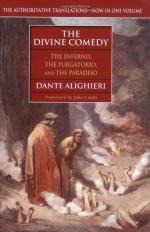|
This section contains 6,974 words (approx. 24 pages at 300 words per page) |

|
SOURCE: "Dante's Theory and Practice of Poetry," in The World of Dante: Essays on Dante and His Time, Clarendon Press, 1980, pp. 146-65.
In the following essay, Grayson contends that the Divina Commedia is a summa of poetic knowledge and technique.
When Dante, at the age of about forty, wrote his major work of poetic theory, entitled De Vulgari Eloquentia, he was in exile from Florence, where he had established over some twenty years a leading reputation as a poet. He had begun in early youth in the style of Guittone d'Arezzo, but he soon broke away, together with certain Florentine contemporaries and under the influence of the Bolognese Guinizelli, from the rhetorical mannerisms and dialectical contortions of Guit-tone, to concentrate his attention exclusively and in a particular way on the theme of love. Dante then created what he himself calls the "dolce stil novo" (sweet new style), of...
|
This section contains 6,974 words (approx. 24 pages at 300 words per page) |

|


